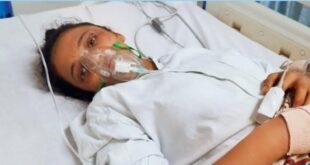Deputy Director and Head of Surveillance at the Ghana Health Service (GHS), Dr Franklin Aseidu-Bekoe, has cautioned Ghanaians not to create an enabling environment for rats to invade their houses in the wake of the looming threat of Lassa fever outbreak.
His caution follows an alert by the Ghana Health Service (GHS) that the disease has affected about 18 states with over 300 cases and 31 deaths in Nigeria, necessitating urgent spontaneous national response actions among all neighbouring countries.
Dr Aseidu-Bekoe speaking on the Executive Breakfast Show (EBS) on Class91.3FM on Monday, 12 February 2018, said although the disease is not in Ghana, keeping the environment clean will drive away rats, who are the carriers of the virus.
He told show host Moro Awudu that: “The virus stays in rodents [that is] rats, but the rat doesn’t show the disease but when the individual is exposed to the virus, you can get it. If you have left over food in your house and rats go and stay on it and pass urine or faeces and the individual goes to eat, you can be infected.
“Another way is when somebody is infected and you get into contact with fluids of the infected person you can also get it. So we get it from animal to man or man to man. This means that if you want to prevent the infection, let’s create a barrier. Do not allow rats to enter your house; do not create enabling environments for rats to enter your house. You get rats in your house when you have left over foods or unwashed utensils so you need to make sure you don’t create that enabling environment and also if you are exposed, make sure you are well protected and these are the methods you can use to prevent it”.
The GHS recommend the following to all health workers and institutions:
- Surveillance on Lassa fever and Acute Haemorrhagic Fevers in general (using case definitions) should be enhanced.
-
Suspected cases of Lassa fever should be managed in specific isolation conditions
-
Health workers should adhere to regular Infection Prevention and Control (IPC) measures to prevent and protect against possible nosocomial transmission
-
Blood sample from suspected case(s) should be taken and safely packaged and sent to Noguchi Memorial Institute for Medical Research (NMIMR) for laboratory investigations
-
All levels (National, Regions, Districts and Facilities) are requested to update their preparedness and response plans for Lassa fever and VHF in general, sensitise the respective staff and create necessary public awareness.
GENERAL INFORMATION ON LASSA FEVER
Lassa fever is an Acute Viral Haemorrhagic Fever illness which is endemic in West Africa. The incubation period is 6-21 days. The onset of LF illness is often gradual, with non-specific signs and symptoms and commonly presents with fever, general weakness and malaise at the early onset.
After a few days, headache, sore throat, muscle pain, chest pain, vomiting, diarrhoea and abdominal pain may follow. Severe cases may progress to show facial swelling, and bleeding tendencies (from mouth, nose, vagina or gastrointestinal tract, and low blood pressure. Shock, seizures, disorientation, and coma may be seen in the late stages.
Complications include: deafness, transient hair loss and gait disturbance may occur during recovery. About 80 % of Lassa Fever infections are mild or asymptomatic.
•Lassa fever virus is transmitted to humans via contact with food or household items contaminated with the urine, saliva faeces, and blood of the rodent (Multi-mammate rat).
•Person-to-person infections and laboratory transmission can also occur, particularly in hospitals lacking adequate infection prevent and control measures.
•The disease is endemic in the rodent population in parts of West Africa and the multi-mammate rat serve as reservoir for the virus.
•Lassa fever is known to be endemic in Benin, Guinea, Liberia, Mali, Sierra Leone and parts of Nigeria, but probably exists in other West African countries as well.
•Ghana recorded first confirmed case(s) in 2011 and two districts, one each in Ashanti and Eastern regions then confirmed outbreaks of Lassa fever.
•Early use of Ribavarine (within seven days of disease onset), supportive care with re-hydration and symptomatic treatment improves survival.
•There is no effective vaccine for the disease at the moment.
 Radio1Ghana Serving Communities
Radio1Ghana Serving Communities










